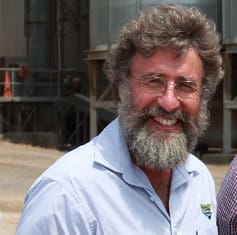
NSW Farmers president James Jackson
NSW Farmers claims a push to ban the surgical mulesing of sheep could lead to an increased dependency on trade-sensitive chemical.
The association is resisting a push to ban mulesing and to mandate pain relief for other routine animal husbandry procedures through a proposed amendment to the Prvention of Cruelty to Animals Act in the state.
The POCTA Bill was introduced by the Animal Justice Party to State Parliament late last year.
NSW Farmers’ president James Jackson said the push to ban mulesing is counter to achieving positive animal welfare outcomes.
“Mulesing is an effective fly-strike mitigation tool, so it needs to be maintained for the sake of animal welfare.
“Banning mulesing would expose millions of sheep to the risk of flystrike, which is a substantially worse welfare outcome,” he said.
“With wool grown in many different climatic conditions across NSW, no one flystrike mitigation approach can be uniformly applied.
For many producers in NSW, mulesing is a key mitigation measure,” he said.
“There is a real danger that banning mulesing could lead to increased dependency on trade-sensitive chemical treatments.
“Greater use of these chemicals also creates the risk of flies becoming more quickly resistant to insecticides, which would lead to sub-optimal fly strike mitigation,” Mr Jackson said.
“NSW Farmers supports the mandatory use of pain relief during mulesing through an industry led-initiative. We don’t support mandating pain-relief through government regulation.”
Mr Jackson said that this bill is pushing for sweeping reforms that would impact on all livestock industries.
“The bill seeks to mandate pain relief for a range of routine husbandry procedures, including earmarking, ear-tagging, branding, castration, de-horning, and tail docking,” Mr Jackson said.
“This would mean significant changes for all livestock industries and these reforms are better driven by industry. Increased industry uptake of pain relief is already occurring, as more products become available and as husbandry practices evolve.
“Farmers need to vocalise their opposition to this bill that seeks to create sweeping reforms.”
NSW Farmers has outlined its position in a submission into the Upper House inquiry on the Prevention of Cruelty to Animals Amendment (Restrictions on Stock Animals Procedure) Bill 2019, and will be appearing before a hearing next Tuesday, 11 August to reiterate its key arguments. NSW Farmers have also encouraged members to provide their own submission via the Parliamentary survey on the Bill.



Mr James Jackson, spending time talking about recycling plastics and plastics in the ocean. The way to solve this horrific problem is stop making plastics. Sheep get flyblown because the wrinkle retains moisture. When the ewe is building the lamb in utero, we need her to build more fibres not wrinkle. It is a complete wast of valuable nutrition (energy) to manufacture wrinkle. We don’t make money out of wrinkle.
Wrinkle causes so many problems — mulesing, flies, colour, dermatitis, shearing difficulties, less lambs and welfare issues etc.
Wrinkle gives us more surface area; however, the fibres are just spread out more. We need the ewe to build twice as many fibres without the wrinkle. When you take away the cause of hard wrinkle being manufactured in utero, you are left with a loose baggy skin with heaps of fibres. It’s a no-brainer.
The Australian Merino could be completely fly-proof and mules-free. All that is needed is the desire and a slight change.
The question for Mr Jackson is: why does he think that a viable alternative to mulesing is not available?
Jim, you should also mention this type of sheep doesn’t need any chemicals applied either.
John Smith, you are so right; widespread resistance to chemicals could become the biggest issue of the lot.
The thing I can’t understand, with the price of wool heading south at record speed, and the cost of mulesing and of pain relief, is that lambs in a non-mulesed flock can be marked without the cost of (mulesing) pain relief with a couple of school kids, who are desperate to get out and be a farmer for a few days.
Like I said before, they are coming for everything and will not be happy until there are no sheep producers. Your viability and costs are of zero interest to them. The activists hope you go broke and rejoice every time someone does.